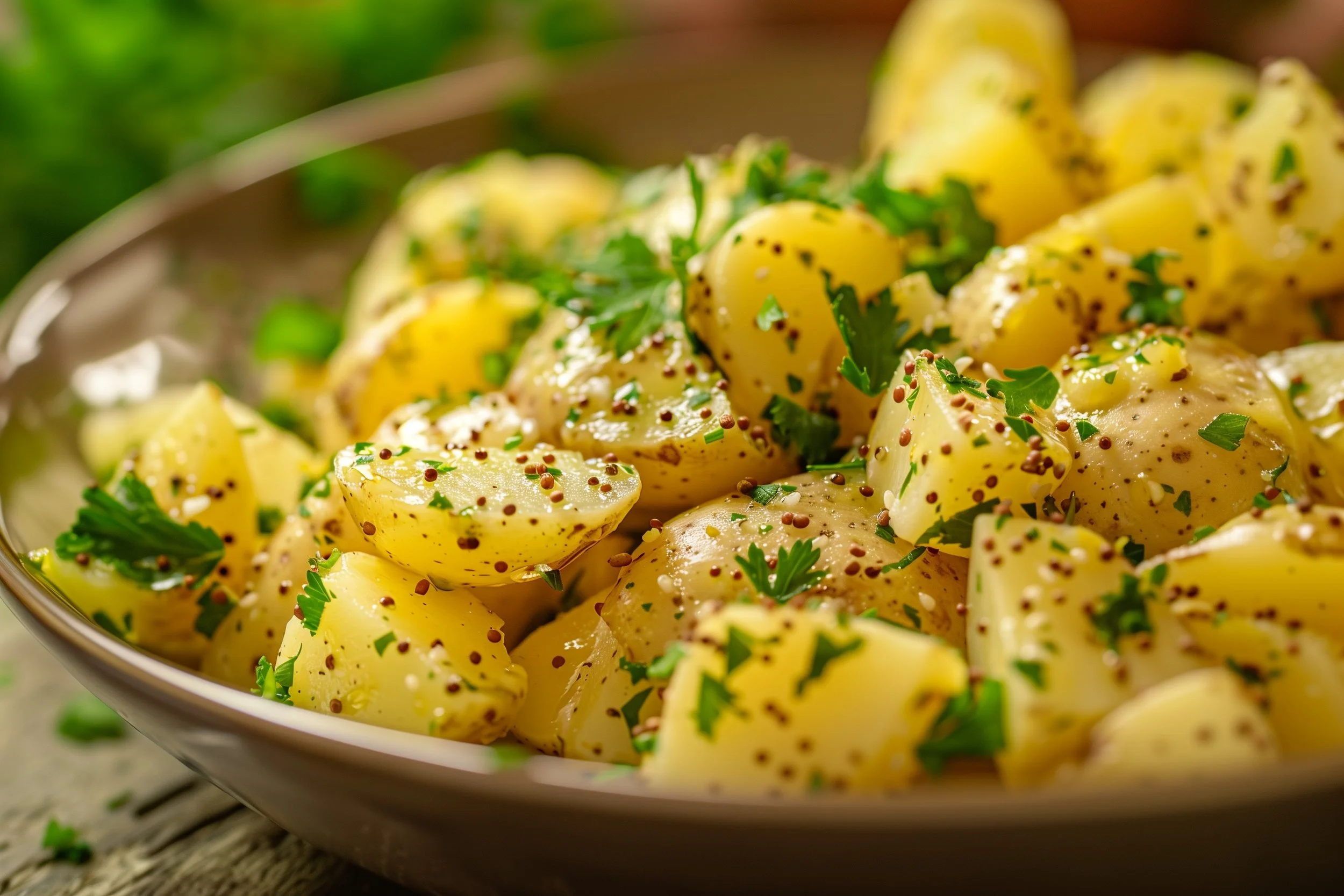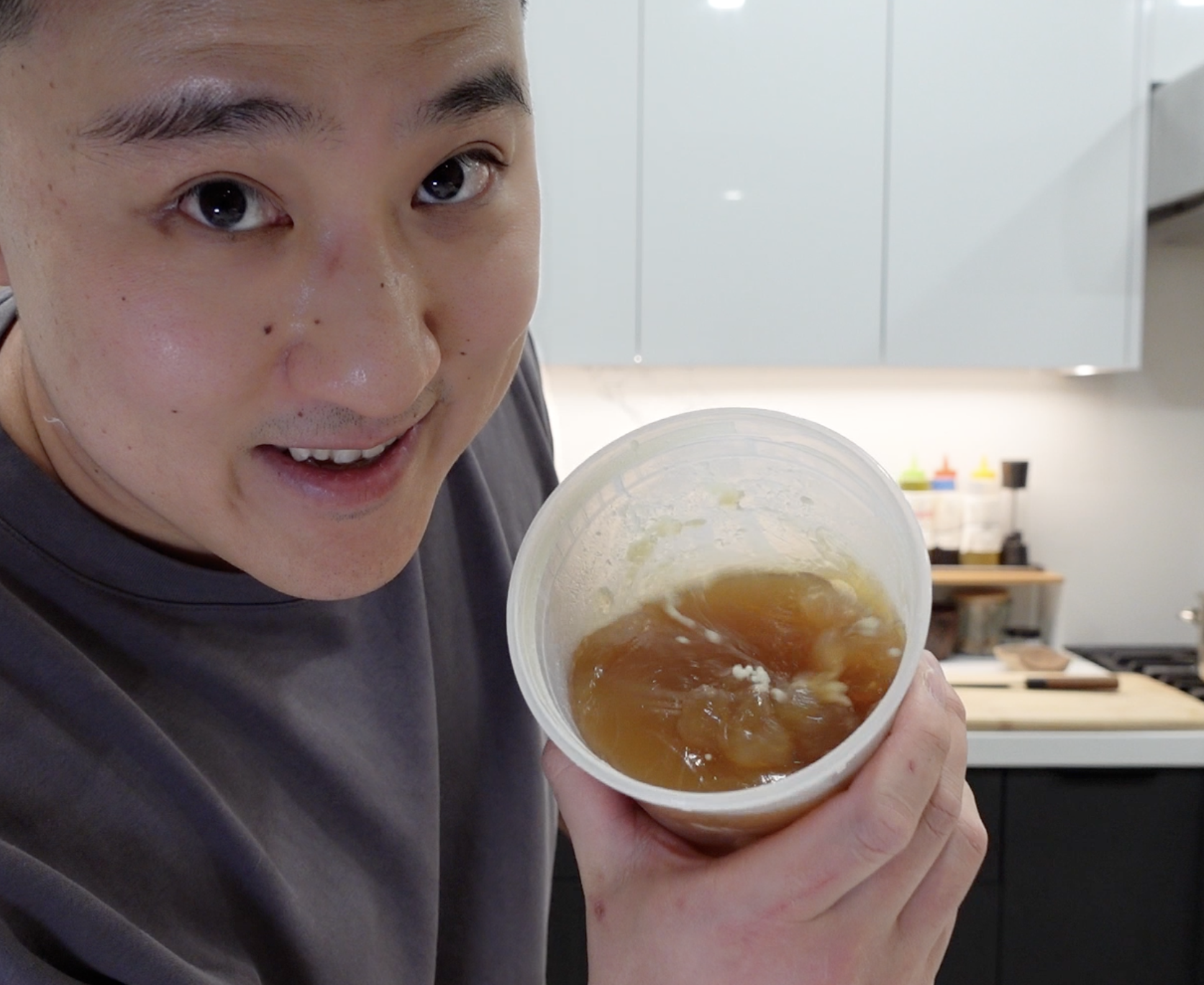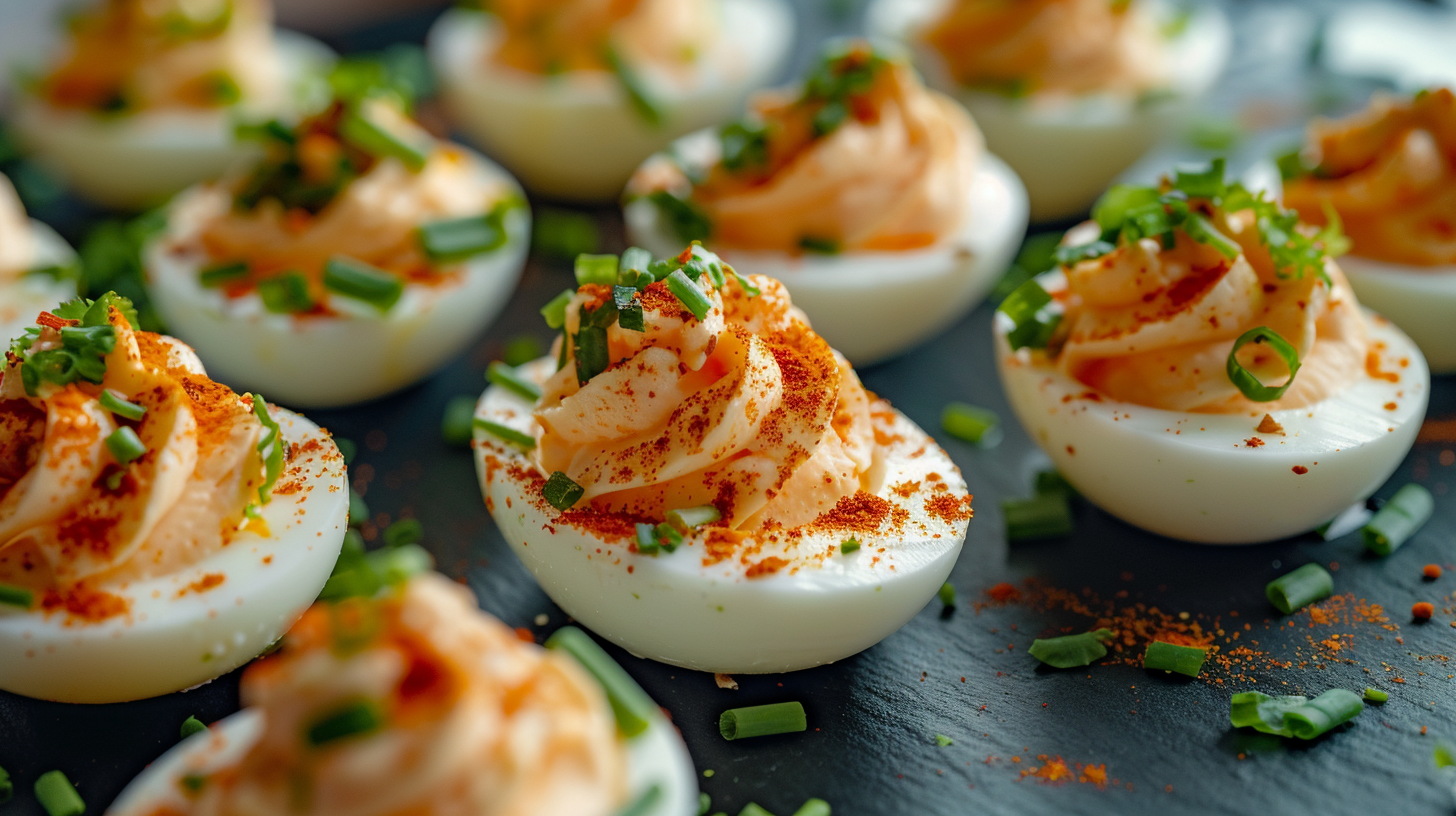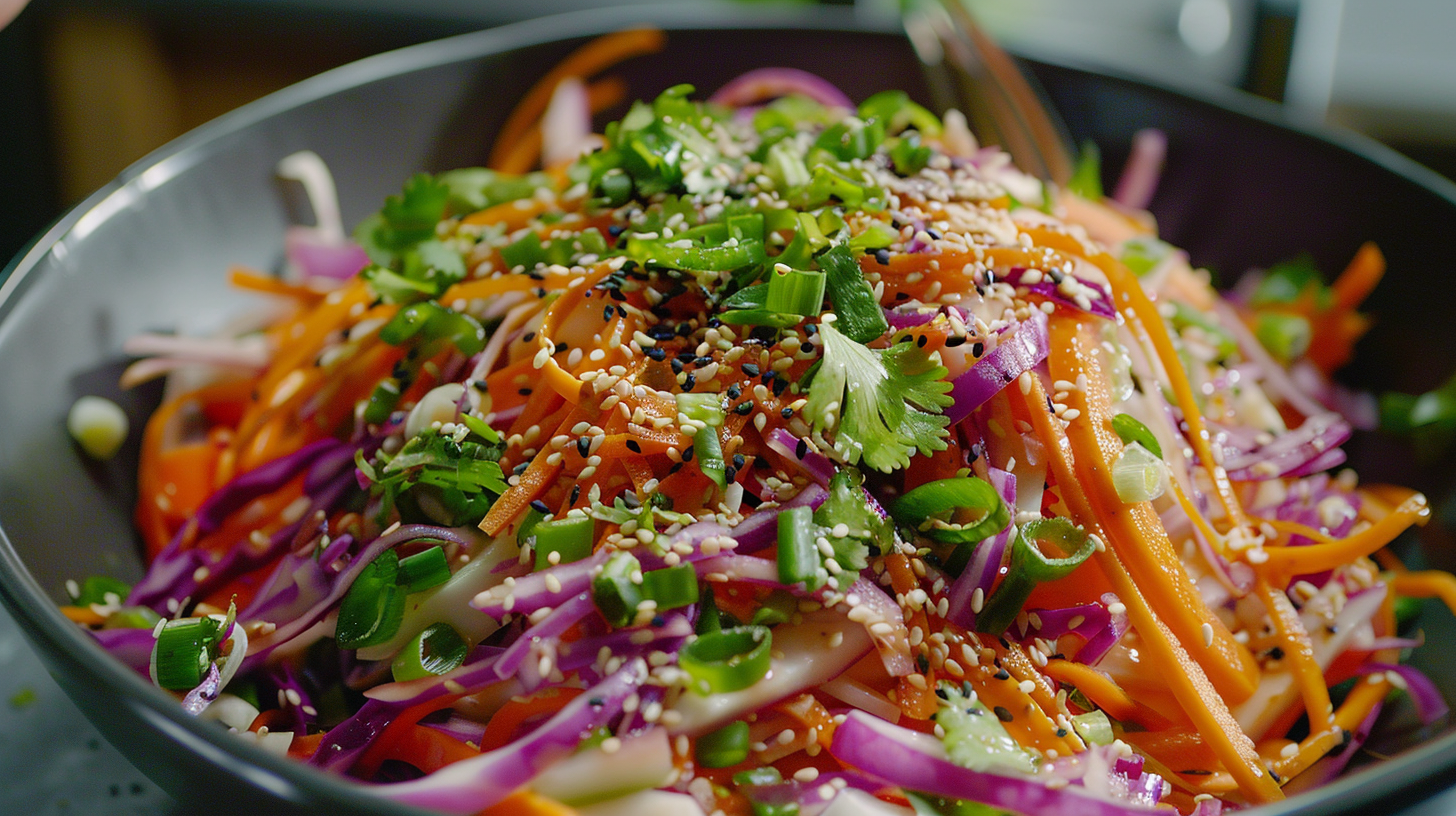Warm Potato Salad with Vinaigrette Dressing
Yield: Serves 4
Prep Time: 10 minutes
Cook Time: 25 minutes
Total Time: 35 minutes
Potato Passions: Crafting the Perfect Warm Potato Salad with Vinaigrette
Hey, fellow food lovers! Today, I’m diving into a dish that’s bursting with flavour—my Warm Potato Salad with Vinaigrette Dressing. This isn’t your typical potato salad. Nope, this one comes with a twist that’s both lighter on the palate and heavy on nostalgia.
The Roots of the Recipe
Let's rewind to my childhood for a sec. My dad always had a stockpile of potatoes in the basement. Growing up with three boys, we ate a lot and potatoes were cheap and could fill us up. Those potatoes weren't just the base of our meals; they were a staple in every hearty meal that my father made in my family's kitchen. Every potato dish I whip up, I think about my father; especially this salad. My father loved potato salads and these dishes are ways for me to remember him.
Why? Because, Science!
Acidity Balance: The ratio of vinegar to oil (roughly 1:3) is crucial for a balanced vinaigrette. Too much vinegar can be overpowering, and too little may make it oily. Adjust according to taste, but maintain the balance for a harmonious flavour. [Click here for my vinaigrette recipe]
Mustard Function: Mustard not only adds flavour but also acts as an emulsifier, helping to stabilize the mixture of oil and vinegar. This means your dressing will stay mixed longer, enhancing the texture and flavour distribution.
Ingredients
750 grams (1.65 pounds) baby potatoes, halved
Whole garlic cloves (3-4 cloves)
1 bay leaf
5 grams (1 teaspoon) salt (additional for cooking water)
2 grams (1/2 teaspoon) black pepper
10 grams (2 teaspoons) grainy mustard seeds (Dijon mustard optional)
15 ml (1 tablespoon) apple cider vinegar
5 ml (1 teaspoon) honey
60 ml (1/4 cup) extra virgin olive oil
15 grams (1/4 cup) fresh parsley, chopped (substitute with tarragon, chives, or basil if unavailable)
Tools Needed
Large Pot
Knife
Cutting Board
Measuring Cups and Spoons
Colander
Mixing Bowls
Whisk
Spatula or Salad Tongs
Optional Add- in Ingredients:
Infused oils (basil, rosemary, chili)
Citrus zest (lemon, lime, orange)
tarragon, chives, basil (if parsley is not used)
Roasted garlic, instead of raw
Chopped capers or pickles
Smoked paprika or a few drops of liquid smoke
Miso paste or finely grated Parmesan
Spicy elements (Sriracha, harissa, wasabi)
Finely ground nuts (almonds, hazelnuts)
Method
Prepare the Potatoes:
Cut and wash the potatoes.
In a large pot, place the halved baby potatoes.
Add 3-4 whole garlic cloves and a bay leaf for flavour.
Sprinkle a generous pinch of salt over the potatoes.
Cover the potatoes with cold water until just submerged.
Place the pot on the stove over medium-high heat and bring to a boil.
Once boiling, reduce the heat to a simmer.
Let the potatoes cook for 15-20 minutes, or until they are tender but still firm enough to hold their shape. Check doneness by piercing a potato with a knife, it should easily be stabbed with no resistance.
Make the Vinaigrette:
While the potatoes are cooking, prepare the vinaigrette in a small bowl.
Combine 15 ml of apple cider vinegar, 5 ml of honey, and 10 grams of grainy mustard seeds in the bowl.
Slowly whisk in 60 ml of extra virgin olive oil to form an emulsion.
If you prefer a smoother flavour, consider adding a teaspoon of Dijon mustard.
Season the vinaigrette with salt and black pepper to taste.
Drain and Dress:
Once the potatoes are cooked, turn off the stove.
Carefully drain the potatoes in a colander and discard the garlic cloves and bay leaf.
Return the potatoes back to the empty pot and set them on the now-turned-off burner from where the potatoes were cooking.
The residual heat will help dry out the potatoes and give them a nice fluffy texture inside.
Transfer the warm potatoes to a mixing bowl.
Combine:
Pour the prepared vinaigrette over the warm potatoes.
Gently toss the potatoes in the vinaigrette, ensuring they are evenly coated. The warmth of the potatoes will help them absorb the flavours.
Add Herbs and Serve:
Chop the fresh parsley, or your choice of tarragon, chives, or basil.
Stir the chopped herbs into the salad. If using multiple herbs, add them sparingly to balance their flavours without overwhelming the dish.
Let the salad sit for a few minutes to allow the flavours to meld together.
Final Seasoning:
Taste the salad and adjust the seasoning with additional salt, pepper, fat or acid if needed.
Serve:
Serve the salad warm or at room temperature for the best flavour experience.
Eugene’s Cooking Tips:
Choosing Potatoes: Opt for waxy potatoes like baby potatoes, red potatoes, or fingerlings as they hold their shape better after cooking and have a creamy texture. The high moisture and low starch content are ideal for salads.
Uniformity in Cutting: Halve or quarter the potatoes to uniform sizes to ensure even cooking. Uniform pieces cook at the same rate, preventing some from being overcooked (mushy) and others undercooked (crunchy).
Starting Cold: Begin cooking the potatoes in cold, salted water. This allows the potatoes to cook gradually and evenly, reducing the risk of the exteriors becoming too soft before the interiors are cooked through.
Flavour Infusion: Adding whole garlic cloves and a bay leaf to the cooking water infuses the potatoes with subtle background flavours that enhance the overall taste without overpowering the dish.
The freshness of Herbs: Use fresh herbs for the best flavour. The rule of thumb is fresh herbs are used at the end of cooking to retain their fresh flavours and dried herbs need a bit of rehydrating which is why they are used during the cooking process.
Adding Dressing to Warm Potatoes: Dress the potatoes while they are still warm to help them absorb the dressing better, enhancing flavour penetration. Warm potatoes are more porous and can take in more of the vinaigrette.
Final Seasoning: Always taste and adjust the seasoning at the end. The flavours can change after the potatoes absorb the dressing, and you may need to add more salt or pepper to balance the flavours.
Kitchen Confessions
I’ve gotta be honest—this recipe is more than just food; it’s a piece of my past served up on a platter. It’s about those family dinners where the kitchen was the place where we would actually sit down together and spend time with each other every day. Bringing this salad to your table is like inviting my family over for a bite (or just me 😂).
I hope you enjoy this recipe. It can accompany most main dishes and remember, you don’t have to use my vinaigrette recipe; feel free to use your own. Cooking is all about having the freedom to use whatever ingredient you want, that’s the fun part.
Your Turn at the Stove
Now, I want to hear from you! Tried tweaking the recipe? Maybe you threw in some extra herbs or (dare I say) added even more garlic? Drop a comment below, share your pics, and don’t forget to tag me @the_eugefood. Let’s make every meal a story worth telling!
You’ll Also Love These
Hi, I'm Eugene, but many of you might recognize me as "The_EugeFood". With over two decades working in diverse kitchens, I've come to cherish the genuine connections and shared experiences that cooking brings. For me, it's not about the high-pressure, competitive world you see on TV. It's about the joy of gathering around a table, the stories shared over simmering pots, and the laughter that follows a shared meal. I'm here to demystify the culinary world, to show you that if you can boil water for cup noodles, you're already on your way. Cooking isn't just a skill; it's a journey of discovery, and I invite you to join me on this adventure to becoming a better cook.









